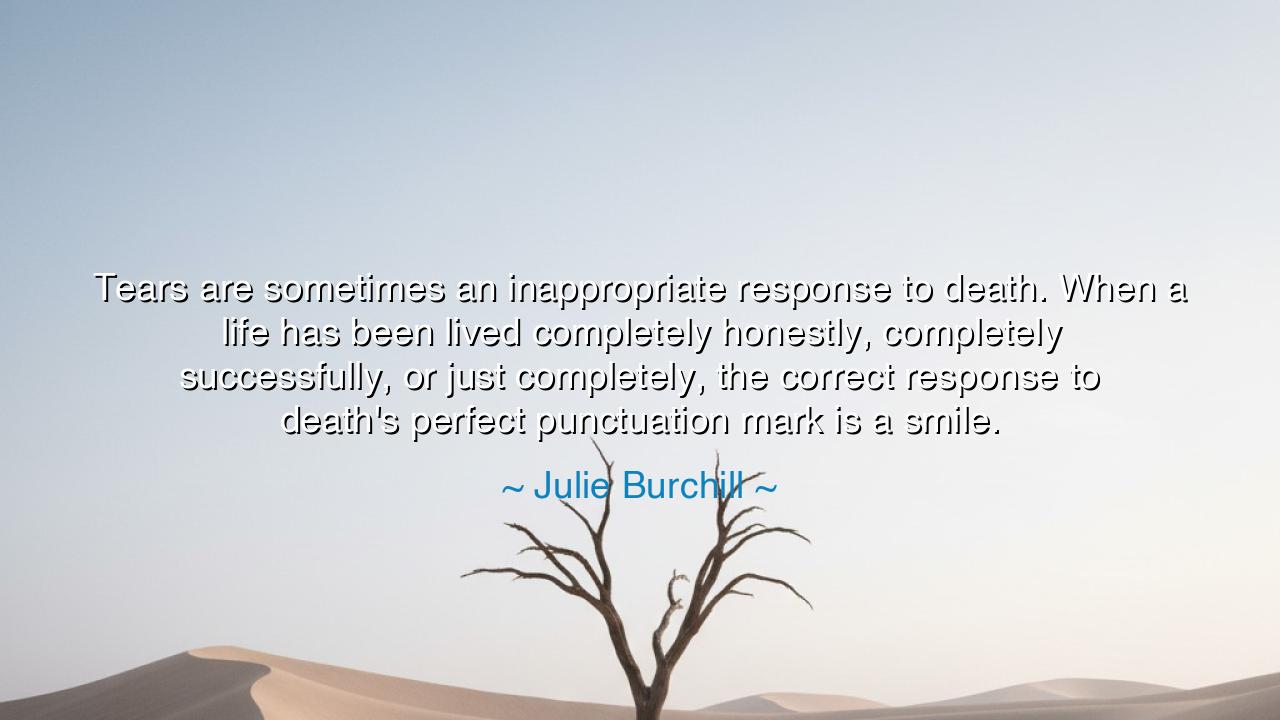
Tears are sometimes an inappropriate response to death. When a
Tears are sometimes an inappropriate response to death. When a life has been lived completely honestly, completely successfully, or just completely, the correct response to death's perfect punctuation mark is a smile.






“Tears are sometimes an inappropriate response to death. When a life has been lived completely honestly, completely successfully, or just completely, the correct response to death’s perfect punctuation mark is a smile.” Thus wrote Julie Burchill, the sharp-tongued essayist whose words often cut through sentiment to reveal truth’s radiant core. In this reflection, she transforms the way we see death, not as tragedy, but as completion — the closing line of a well-lived story. She invites us to view life not as a series of losses, but as a composition, and death not as an interruption, but as a perfect punctuation mark, sealing the beauty of a finished work.
To most hearts, death stirs tears — it feels unnatural to smile when something precious ends. Yet Burchill speaks here as the ancients once did: as one who sees beyond the moment of mourning, into the wholeness of existence. She reminds us that when a person has lived with honesty, courage, and fullness, their death is not a defeat, but a fulfillment of destiny. To such a soul, death does not come as a thief, but as an artist signing the final brushstroke upon a masterpiece. For the complete life — whether brief or long, joyous or sorrowful — is not measured by duration, but by truth of being.
There is deep wisdom in the phrase “completely lived.” To live completely is to leave nothing unsaid, to face both joy and sorrow without fleeing, to love without cowardice, and to stand by one’s principles even when the world turns cold. It is to be present in every hour of one’s days, and to shape one’s existence into something whole. Such a life, when it ends, leaves no lingering regret, for it has already given its full offering to the world. To weep for such a life, says Burchill, is to misunderstand it; to smile instead is to recognize the triumph of having finished well.
Consider the story of Socrates, who, condemned to death by his city, drank the cup of poison without fear. He did not cry out, nor did his friends see terror in his face. He spoke calmly, reflecting that death was either a peaceful sleep or a journey to another realm of wisdom. His last words were not of despair but of care — reminding his companions to offer thanks to the healer-god for the release of life’s burdens. Socrates had lived honestly, questioning, learning, and teaching to his last breath. His death, therefore, was not tragedy, but completion — a full circle drawn by a life lived in truth. And so his students wept, but history smiles, for his life was a work finished perfectly.
In Burchill’s imagery, death’s punctuation mark is the symbol of clarity. Just as a writer brings sense to her sentence through its ending, so life finds meaning through death. Without the final mark, the story would trail on without coherence. It is death that gives the arc of our existence its shape, transforming chaos into narrative, and fleeting moments into memory. To fear or despise death, then, is to misunderstand the symmetry of being alive. For just as the sunset completes the day, and the silence completes the song, so does death complete the life that was fully lived.
Yet, let us not mistake her words for coldness. Julie Burchill does not scorn grief — she simply asks that we remember what it signifies. When tears fall for the departed, they should not be for the ending itself, but for the absence it leaves in us. The smile she speaks of is not one of indifference, but of reverence — a smile born of gratitude, of recognizing that we were privileged to witness a life of wholeness. To smile at the passing of a fulfilled soul is to honor their courage, their integrity, and the light they leave behind. It is the ultimate affirmation that life, not death, has won.
Lesson: Do not wait for the end to make peace with your own story. Live so completely, so truthfully, that when your time comes, those who love you can smile through their tears. Speak the words that must be spoken. Forgive freely. Love boldly. Leave no melody half-sung, no kindness withheld. Then, when death comes — as it must — it will not be an intruder, but a friend, gently closing the final page of a story that was beautiful, complete, and worth retelling.
So remember the wisdom of Julie Burchill: that the truest response to a life well-lived is not despair, but gratitude. Death, in its perfection, does not erase the beauty of life — it reveals it. And when that moment comes for one who has lived with wholeness, let there be no cry of “too soon,” but a smile that whispers, “it was enough.” For such a smile is not the denial of grief, but the triumph of love over sorrow — the last, bright echo of a life lived completely.






AAdministratorAdministrator
Welcome, honored guests. Please leave a comment, we will respond soon